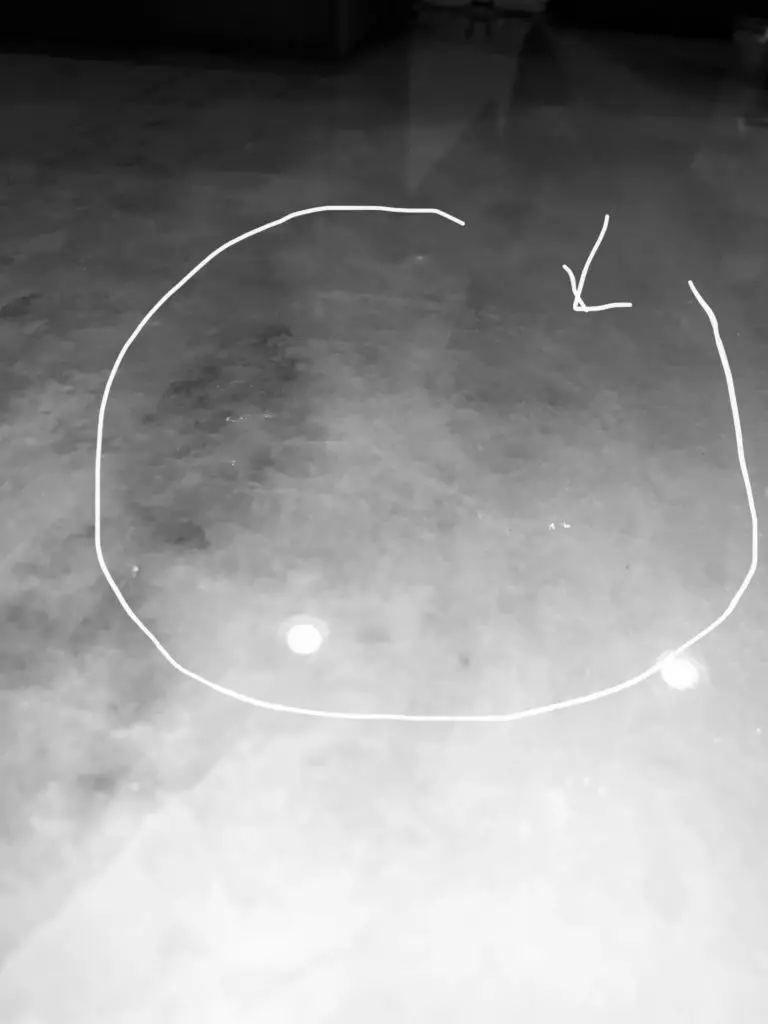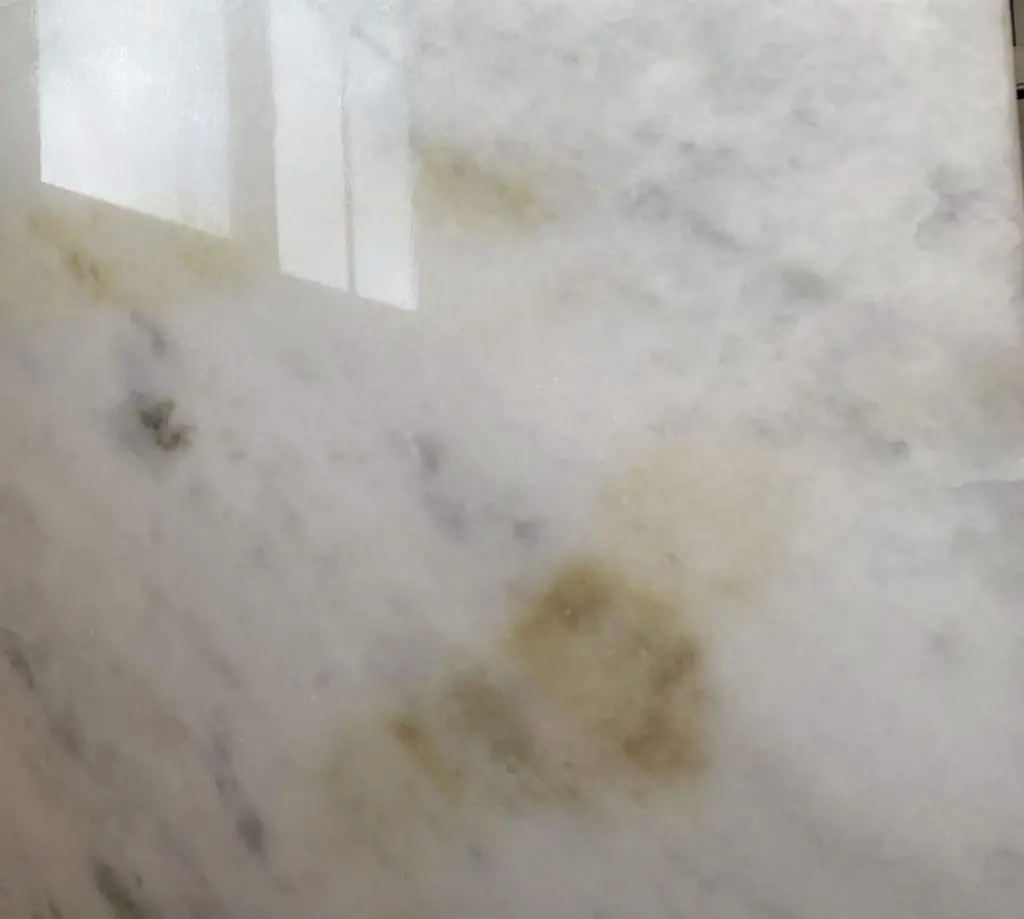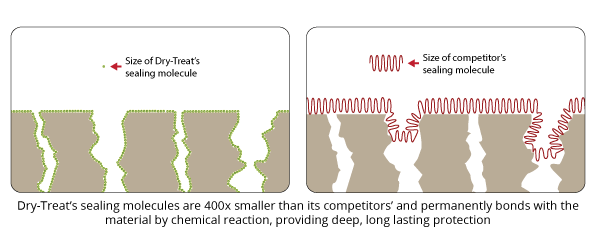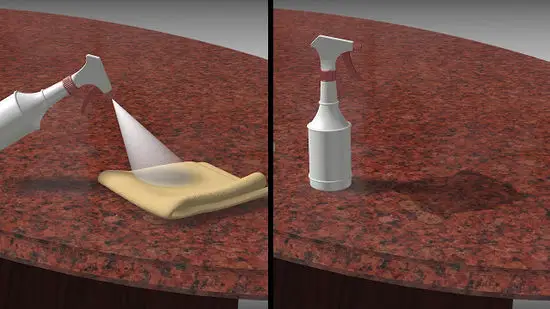Granite is a natural stone that resists dirt and spills. However, there is no stone that completely repels moisture, which is why sealing your granite countertops is very important. A high-quality countertop sealer like Dry-Treat is designed to prevent staining and etching that can occur when a liquid is left on a granite countertop for an extended period.
Dry-Treat was listed as the best granite sealer available in this article. It is actually my preferred sealer and what I use in my own home.
Granite is a quite porous stone, which means liquids will quickly absorb into the granite, causing stains. Every homeowner who has granite countertops should have them sealed. A granite countertop sealer reduces the porosity of the granite so that it can repel liquids.
Instead of soaking into the granite, any spilled fluid or oil will bead up on the surface of the granite rather than soaking into the granite. A sealer works to prevent staining and etching from occurring.
If you love your granite countertops and want to keep them looking great, you need to be sealing your granite countertops with a sealer like Dry-Treat. Check out our recommended sealers page here. This impregnating sealer goes deep into your granite countertop to offer optimal protection and stain resistance.
Many homeowners have heard that granite countertops require a lot of maintenance and upkeep. The thoughts of routine maintenance can prevent many homeowners from purchasing granite counters for their kitchen and bathrooms.
Although certain natural stone countertops like marble do require regular upkeep and maintenance, granite countertops are much easier to take care of. The only thing that is needed to keep your countertops looking great is applying a granite sealer designed for countertops.
Granite is a very durable natural stone countertop; however, unless it is sealed, it does not have the capability to repel moisture and prevent staining.
A granite sealant works by soaking into the granite to provide a shield against moisture absorption, etching, and staining. Sealing your granite countertops will reduce the risk of damage.
If granite is not sealed, liquids like wine can soak into your granite, resulting in discoloration and a dull finish. Who wants that?
Once granite countertops are properly sealed, the upkeep and maintenance will be minimal. You can care for your granite countertops, much like you would care for any other type of countertop. However, acidic cleaners should not be used on the granite.
Even after the granite has been sealed, etching can occur if the granite is exposed to harsh detergents and acids. Use a mild soap and water or a pH neutral granite cleaner to keep your granite countertops looking amazing.
When a homeowner has granite countertops installed in their bathrooms or kitchen, especially white granite colors, they may if their granite sealed before they countertops were installed, or if the countertops need to be sealed after they have been installed in their kitchen, bathroom, or outdoor spaces.
Luckily, you can determine if your countertop has already been sealed or if it needs to be sealed with a simple water test. All that is required to determine the porosity of a granite countertop is some distilled water, a measuring cup, and a timer.
To perform the water test, pour approximately ¼ cup of distilled water in an inconspicuous location on your granite countertop. (Distilled water is the ideal type of water to be used for this test because tap or spring water contains minerals that can damage your countertop and dull it out.)
After you have poured the water on your countertop, start your timer. The amount of time it takes for the water to absorb in your countertops will help you determine if your counters need to be sealed and how many coats of granite sealer should be used to protect your counters from stains, water damage, and etching. Let’s take a look at the four different time frames and how these time frames determine the amount of granite sealer that needs to be applied.
A granite sealant keeps your countertops looking great for many years. The granite sealer prevents liquids, oils, and dust from penetrating the surface of the granite and being absorbed into the stone. When granite is correctly sealed, your countertops will remain protected and continue to look fantastic for many years to come.
In addition to determining the porosity of your natural stone countertops with the water test mentioned above, you should determine the natural stain resistance of your granite countertops. Two different tests should be performed to determine if you need to apply a sealant that protects against stains and etching.
A granite sealant can be used on most types of granite; however, certain granite countertops can be harmed by a granite sealer. If your countertops have already been sealed or naturally repels liquids, applying a granite sealer can cause your counters to appear dull or look like they have a waxy buildup.
A sealant should only be used when the granite begins to absorb liquids. Otherwise, the granite sealer will just sit on top of the counter and will not offer any additional protection.
If water is quickly absorbed into your countertop, the risk of staining and etching increases dramatically. Sealing granite countertops using a stain-resistant sealer helps protect your counters. Furthermore, a granite sealer makes the maintenance of your granite countertops much more manageable. Cleanup will be a breeze, and the risk of damage is minimized.
The first test that you should do uses mineral oil. Apply a few drops of mineral oil in an inconspicuous location and allow to sit for at least ten minutes. If the granite darkens from the mineral oil, you should not use a petroleum-based granite sealer.
A petroleum-based granite sealer will soak into your granite and darken it. Unfortunately, this type of sealer will cause uneven dark spaces on your granite. Instead of using a petroleum-based granite sealer, opt for a water-based granite sealer.
The second test uses a fresh lemon. Roll the lemon in your hands for a moment to get the juices flowing. Then, cut the lemon in half and apply about five drops of fresh lemon juice to an inconspicuous area of your countertop.
Closely watch the area to see if the granite darkens within the first two minutes. If it does, a stain-resistant sealer should be applied. Conversely, if the granite darkens after five minutes, you need only apply a sealer without an added stain resister. Finally, if the granite counter does not darken within one half of an hour, your granite countertop is stain proof, and a sealer does not need to be applied.
Certain granite countertop colors are naturally resistant to moisture and dirt and do not require a sealant to be applied; however, using a granite sealer can prevent etching and staining from occurring.
Etching occurs when acidic liquids like cleaning products, vinegar, soda pop, coffee, wine, bleach, ammonia, or fruit juices (grape juice, orange juice, lemon juice, etc.) come in contact with the countertop. If these liquids are allowed to remain on the surface, the polished finish of the granite can become dull and hazy.
For a bathroom granite countertop, you will expose it to chemicals like face wash, toothpaste, mouth wash and so much more.

Example of Etching:
Colored liquids that are commonly found in and around the kitchen (cool-aid, juice, wine, etc.) can soak into the granite and discolor it. In addition to liquids, cooking oil and other fats can cause discoloration.
Many homeowners are surprised to learn that setting a pizza box on a granite countertop can result in a stain. If grease from the pizza soaks through the pizza box and is allowed to soak into the countertop, staining can occur.

Example of Staining:
Most kitchens are the center of the home where families get together. Time is spent in the kitchen cooking, enjoying dinner together, doing homework, and much more. If your kitchen or bathrooms have granite countertops, you should complete the water test and the stain test to determine if you need to seal your countertops.
A high-quality sealer like Dry-Treat prevents etching and staining and keeps your countertops looking amazing. A sealer reduces the risk of damage to your granite countertops because the sealer penetrates the surface of the countertop, creating a stain-resistant and water-resistant seal.
Granite sealers contain resins that have been dissolved into either a water-based or a petroleum-based solvent. When granite sealer is applied correctly, it will penetrate the granite and form a protective film over the surface of the granite countertop to prevent oils, dust, and moisture from seeping into the granite countertop.
The sealer offers a layer of protection; however, even when a sealer is applied to granite countertops, stains can occur if a spill occurs and is not cleaned up quickly. Furthermore, sealers soak into the stone to prevent deep stains; however, surface staining can occur.
Granite sealers are designed to reduce the absorbency rate of granite, making it difficult for liquids to mar the surface of your granite countertop. Unfortunately, the level of protection offered by a granite counter sealer can vary from brand to brand.
In addition to the brand, how well the sealant is applied can affect the amount of protection offered by a granite sealer. For best results, you should use a high-quality impregnating sealer like Dry-Treat. This type of sealer goes deep into the granite, and seals are naturally occurring fissures in the granite.
Even if a granite countertop has been sealed, all spills should be cleaned up immediately. To clean spills, blot up the liquid using a soft cloth and then use a pH neutral cleaner to wipe away all traces of the liquid. Cleaning your counters regularly with a cleaner specially designed for granite will keep your counters looking fabulous for many years to come.
When choosing a sealer, you want one that is formulated for natural stone surfaces. When reading the description, make sure that it is safe to use on granite. The best sealer for granite is a penetrating sealer called an impregnator.
This type of sealer soaks into the granite countertops to decrease the rate of absorption of the stone, which minimizes the risk of etching and staining.
If the wrong type of sealant is used or applied improperly, it can affect the beauty and the structure of your granite countertops; therefore, read the description and the instructions carefully before purchasing and applying it to your granite countertops.
If the wrong type of granite sealer is chosen or applied incorrectly, it can cause your granite countertops to have a dull and waxy appearance.
Finally, when choosing an impregnator for your granite countertops, you want one that is safe to use on granite countertops in the kitchen. Food will be prepared on your counters; therefore, you want a sealer that is safe for food preparation surfaces.
Granite countertops for your kitchen will cost you thousands of dollars. Why risk damaging your countertops by not researching the sealer used on your countertops? Instead, do your research and find a high-quality sealer designed to protect against staining and etching.
Different granite slabs will have different levels of porosity. Some granite will require frequent applications of granite sealer, while others do not require frequent applications.
The steps for sealing granite countertop are easy and can be completed in an afternoon. However, many homeowners prefer to leave the granite sealer application to the professionals. If the sealant is applied improperly, the surface of the granite can become damaged and will not provide the level of protection that your granite countertops require.
You need a high-quality granite sealer like Dry-Treat that is specially designed for granite countertops. This product will provide you with long term protection without the need for frequent repeat applications. In fact, Dry-Treat offers a fifteen-year performance warrant when it is applied using a recommended application, and the directions are followed explicitly.
When choosing a sealer for the granite countertops in your kitchen, look for one that has been approved for countertop application. Never apply a product that is not intended to be used in food prep areas. Dry-Treat’s deep penetrating formula uses the latest technology to protect against damage from accidental liquid, oil, or salt spills. Furthermore, a high-quality granite sealer will prevent dust particles from going deep into the surface of the granite, resulting in a dull surface.
The Dry-Treat sealant for granite is breathable. This formula allows water vapor to escape from the granite to prevent moisture buildup in the natural stone. Once you have sealed your countertop, it will be much easier to keep clean. It will repel water and oil to provide superior protection against stains, and your counters will dry much quicker.

Before you ever begin sealing your granite countertops, you must prepare your countertops for the process. You will want to thoroughly clean your counters using a pH neutral granite cleaner. Although you can use soap and water for daily cleaning, you need to use a granite cleaner before applying the sealer.
Granite cleaner is designed to prevent damaging or dulling the finish of your granite. Before you begin, read the cleaner’s instructions and follow them explicitly. You always want to test an inconspicuous spot before using it on your counters. This spot test will ensure the granite will not be damaged or stained from using the product.

After you have read and understood the instructions, remove everything from your counters, including all decorations, appliances, etc. With a soft, clean cloth, gently wipe your counters to remove all dust, breadcrumbs, etc.
Once this step is complete, apply the granite cleaner to your countertop using a clean, soft cloth. The granite cleaner should be applied using a circular motion. When you are cleaning your countertop, begin at the spot where the backsplash meets the granite and work down to the countertop edge. Make sure to thoroughly clean along the edge your sink and any other drop-in appliances as well. You want to ensure that all areas of your countertops are thoroughly cleaned before the sealant is applied to ensure an even application.
Allow the granite to thoroughly dry before you apply a granite sealer. The drying times for a granite sealer will depend on the thickness of the application layer as well as the brand of the product. Additionally, the temperature and humidity levels can affect drying times. Once you have cleaned your counters and purchased your sealer, it is time to begin applying the sealer.
Work in small areas to prevent the sealant from drying on the countertop surface. Apply the sealer and allow it to absorb into the counter for the recommended amount of time. (Refer to the times listed on the sealant.) Typically, the sealer should be allowed to remain on the granite for between five minutes and thirty minutes.
Once the recommended time has passed, remove all excess sealer. Then, you will need to apply a second layer of granite sealer to your countertop. Leave the granite sealer for the recommended amount of time and wipe away any excess sealer. Continue applying the sealer using this method until the recommended number of coats of sealer has been applied, or the granite will no longer absorb any sealer.
It is imperative that excess sealer is removed after each step. If any excess sealer is allowed to dry on the granite countertop, it can cause uneven spots to the surface of the granite, or those areas can appear waxy once the sealant has dried.
Although it is possible to seal your granite countertops yourself, a stone restoration specialist has the skill and the knowledge needed to do a fantastic job. A stone specialist knows the best product for your granite countertops. The specialist will also ensure every inch of the countertop is properly sealed.
Furthermore, the stone restoration specialist will know how long it will take the product to fully dry, how many coats of granite sealer to apply, and how to safely handle the granite sealer. A stone restoration specialist also understands how often your granite countertops should be sealed.
Once your granite countertops have been sealed, they will be protected against discolorations caused by accidental spills. A granite countertop sealant will enhance the natural beauty of your granite.
The sealer will bring out the colors in your granite counters and make the colors pop. Furthermore, when granite countertops are properly sealed, the countertops are more durable and will last longer.
A high-quality granite sealer makes your countertops resistant to liquids, oils, household cleaning products, foods, and dirt that can mar, discolor, or etch the granite. A granite countertop sealer makes your countertops scratch resistant and much easier to clean.
One of the most frequent asked questions by homeowners have is how often you should be sealing your granite countertops. There is no perfect answer to this question. The sealer will breakdown over time, depending on the quality of the granite, the application process used, and the brand of granite sealer used.
In addition to this, the cleaning products that you use on your granite counters can affect the lifespan of your granite sealer. Using a pH neutral sealant designed for granite will help your sealer last longer than using soap and water or other household cleaners.
The porosity of the granite and the type of granite can affect how frequently your granite countertops need to be resealed. The sealant will also last longer when it is applied by a stone restoration specialist; however, the skill of the granite restoration specialist can affect the length of time that the granite sealer will last.
The color and type of granite will also affect the longevity of the granite sealer. Light-colored granite will need to be resealed every three to five years. The water test should be completed each year to help you know when it is time to reseal your granite countertops.
If the water remains on your granite countertop for at least ten minutes, your countertop is still adequately protected, and it does not to be resealed. However, if the water soaks in before the ten minutes have expired, a fresh coat of granite sealant should be applied.
Dark-colored countertops typically do not need to be resealed as often as lighter-colored countertops. However, it is crucial to realize that a sealer protects your granite from etching and staining. Although there is no product on the market that totally protects against damage, such as staining or etching, a high-quality sealer designed for granite reduces the porosity of the stone so liquids will not immediately soak into your granite countertops.
Granite sealers work by filling the fissures found on the surface of your granite countertop. The pores of the granite will be sealed to reduce the risk of damage. Both the pores and fissures that naturally occur in granite can allow food particles, dust, and moisture to accumulate and enter the granite.
If this happens, your granite countertops can become dull and cloudy. A high-quality granite sealer will fill these fissures and pores to help protect your granite countertops and ensure they remain looking as good as they did on the day that they were installed.
No, there are no granite sealers on the market that can guarantee a permanent solution for sealing your granite countertops. Luckily, the Dry-Treat granite sealer will provide you with long-lasting results. When the granite sealer is appropriately applied, you can expect to receive at least fifteen years of protection before your granite countertops will need to be resealed.
To ensure maximum protection of your granite and ensure it will last for many years to come, it is recommended that a stone restoration professional seal your granite countertops.
If you notice that liquids are not pooling on the granite surface the way it did when your granite countertops were first sealed, it may be time to apply another coat of the granite sealer. Doing a granite water test will help you determine the porosity of the countertops and whether it is time to reseal your granite countertops. Knowing how often you should be sealing your granite countertops is crucial.
Although granite countertops cannot be permanently sealed, high-quality products like Dry-Treat can extend the time between applications. Most homeowners want a product that will last for many years before requiring reapplication. With this product, you can rest assured that your countertops will remain protected for fifteen years before an additional application of granite sealer will need to be applied.
Granite countertops increase the beauty and value of your home. This natural stone will last a lifetime if properly cared for. Proper care involves cleaning up spills as soon as they occur, using a neutral pH cleaner, and sealing your countertops whenever it is needed.
Kitchen and bathroom countertops are exposed to a lot of fluids, including water, detergents, juices, and more. If you have granite countertops in these areas, you need to ensure that your countertops are adequately protected by applying a high-quality granite sealer like Dry-Treat Stain Proof Premium Impregnating Sealer. This sealer contains resins that soak into the pores of your granite countertops to reduce porosity and protect against etching and stains. Dry-Treat will provide continuous protection for 15 years, ensuring that your countertops look and perform amazingly.
If you are not sealing your granite countertops you will notice etching and stains after use of your kitchen countertops. Spills and splatters are bound to happen, and that is why it is very important to seal your countertops. Sealing also preserves the shine. It allows for more time to clean up your mess preventing stains and etching from happening. What happens if you don't seal granite countertops? If you don't seal them you will surely find out fast.
Yes, black granite countertops should be sealed. Sealing your black granite countertops not only protects against staining but also helps to prevent etching. Etching causes the shine on your countertop is dull due to chemicals or grease, and usually in random spots on your countertops. Grease affects any color of granite material. It will cause a darker stone to have an even darker spot where the grease was spilled.
